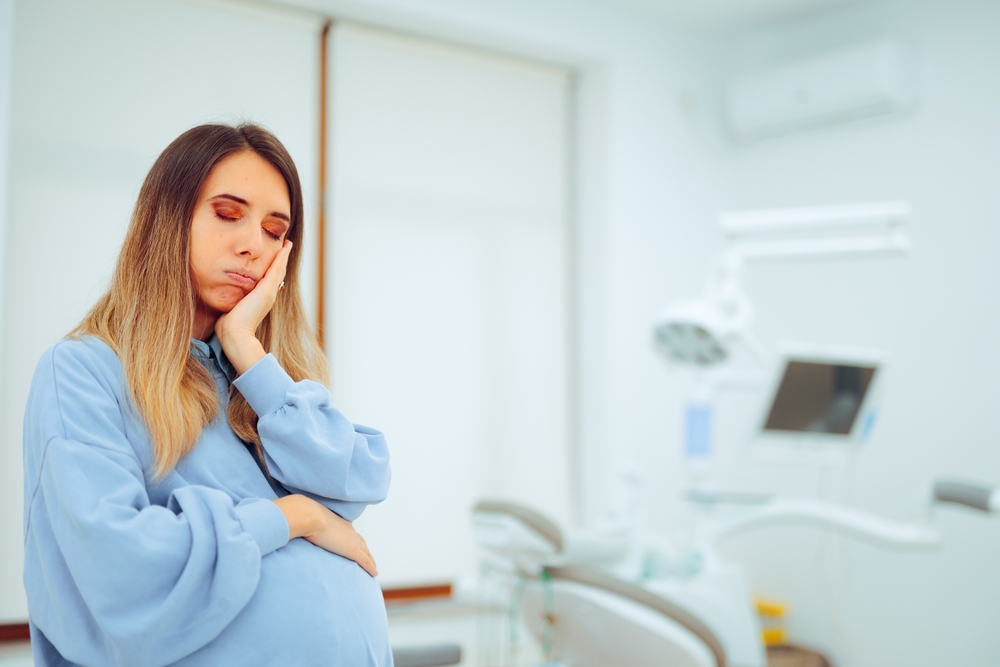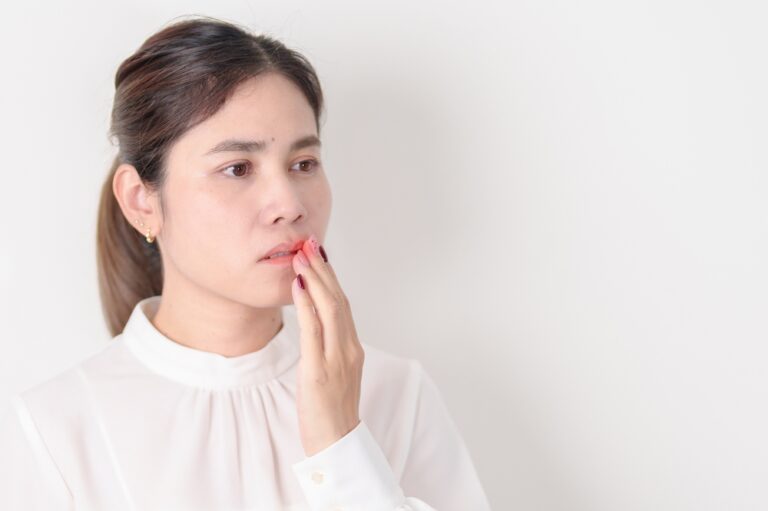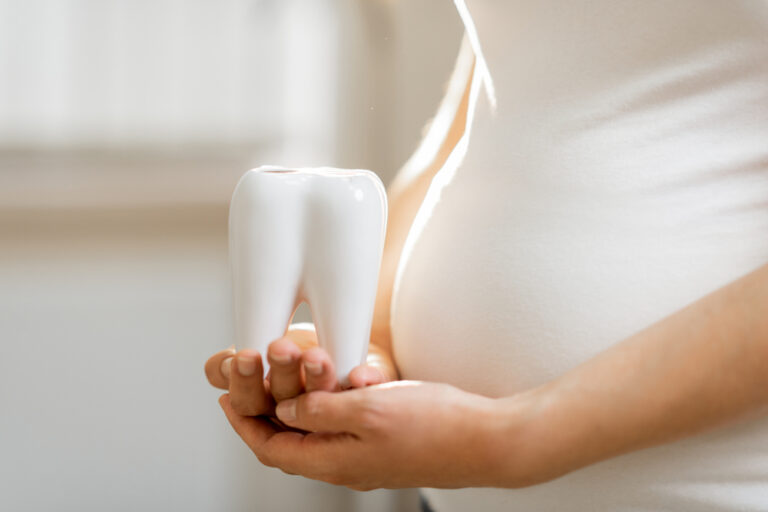Medical Disclaimer: This content is for educational purposes only and does not constitute medical or dental advice, diagnosis, or treatment. The relationship between oral health and pregnancy outcomes is an area of ongoing research, and individual circumstances vary. This article discusses associations found in research but does not establish definitive causation. Always consult your dentist, OB/GYN, and healthcare team for personalized medical advice. Never avoid or delay professional dental care during pregnancy based on information in this article.
The age-old saying, ‘Gain a child, lose a tooth,’ is a myth that doesn’t have to be your reality. With proper oral care and regular dental visits, you can maintain excellent dental health throughout pregnancy and beyond. The importance of dental health while pregnant often gets overlooked. With the right knowledge and small daily habits, you protect your smile and safeguard your overall health.
Oral infections can quietly affect your overall pregnancy health. Tooth pain while pregnant could be a sign of a more serious issue, so if you’re experiencing dental pain, discuss potential causes with your dentist.
While immediate pain relief is often the priority when you visit the dentist, understanding the broader health implications of oral health and infections during pregnancy can help you make informed decisions about your care.
Let’s take a closer look at why tooth pain during pregnancy is more than discomfort, and why it is important to take note for a healthy pregnancy.
What Tooth Pain in Pregnancy Is Really Telling You
During pregnancy, your risk allowance for pain medication is lowered. Paying close attention to tooth pain is vital to uncover any health issues and address them accordingly. Paying attention to tooth pain during pregnancy matters — but problems can still exist even when you are symptom free.
The Myth of “If It Doesn’t Hurt, It’s Fine” for Prenatal Health
While you mat notice obvious changes like canker sores during pregnancy, some potentially harmful issues can be present in your body even without pain. Bacteria from painless oral infections can pose a health risk for you and your baby.
Common pregnancy-related oral diseases and their symptoms include:
- Gingivitis: This often begins with little to no pain in the early stages, but you may notice inflammation and bleeding when brushing your teeth.
- Periodontitis (advanced gum disease): Periodontitis can be a painful infection. You may experience tender gums, loose teeth, and abscesses.
- Tooth erosion: The acidic wear caused by vomiting during morning sickness can cause tooth sensitivity and pain later on. You may feel sensitivity to hot or cold food because erosion weakens the tooth.
- Xerostomia (dry mouth): While not usually painful, xerostomia can be uncomfortable or irritating. The burning sensation you have in your mouth can make eating challenging.
- Pregnancy epulis (pyogenic granuloma): These non-cancerous growths on the gums can occur due to hormonal changes and plaque buildup. They’re usually painless unless large or irritated, and often resolve after pregnancy. Your dentist can advise on whether removal is necessary. It’s easy to brush off painless dental issues, especially with so much already on your mind during pregnancy. But even silent infections can carry forward and affect both you and your baby.
The good news is that simple steps — like regular checkups and gentle oral health care — are often all you need to take care of your teeth during your pregnancy. Prioritizing oral hygiene daily goes a long way in keeping you healthy and giving your little one the best start possible.
The Oral-Systemic Connection in Pregnancy
Inflammation or infections in your mouth are not isolated. Bacteria flow into your bloodstream, causing or worsening problems throughout your whole body. Pregnancy dental pain, or even sensitivity, can have a ripple effect on your baby and pregnancy.
This connection between mouth and body is known as the oral-systemic connection. Many people overlook this link while they’re pregnant, and even after giving birth. Has your obstetrician asked about your dental health? Many see the body and mouth as separate entities.
Here’s how the oral-systemic pregnancy connection can look:
- Tooth pain during pregnancy starts
- Pressure and sensitivity increase — sometimes mild, sometimes severe
- Oral bacteria from cavities or infection enter your bloodstream and strain your body
- Nausea, or you feel unwell, and seek treatment from a doctor
- Treatment — the doctor treats only the symptoms, and the dental problem gets worse
Researchers have identified potential relationships between oral health and overall health. Oral infections can cause localized symptoms like pain and sensitivity. In some cases, bacteria from oral infections may enter the bloodstream. The body’s inflammatory response to infection may have broader effects, and untreated dental problems can worsen over time.
These factors underscore why maintaining oral health during pregnancy is considered important. The exact mechanisms and individual impacts vary. Regular dental care helps identify and address problems early.
Pregnancy and Birth Complications Linked to Oral Infections
Are your teeth making you sick? During pregnancy, your body experiences intense adjustments. Your hormones fluctuate and trigger many physical and psychological changes. While the focus is mainly on the baby, the new surge of hormones can affect your mouth’s natural oral bacteria during pregnancy. Gums also become more reactive to dental plaque during pregnancy, increasing sensitivity.
Even if you don’t experience tooth pain while pregnant, studies have linked the following pregnancy complications with poor oral health:
Preterm Labor and Dangers for Your Baby
Research shows that periodontal treatment while pregnant can result in a lower risk of perinatal mortality, low birth weight, and early childbirth. Caring for your gums isn’t just about comfort. Your gum health can directly influence your baby’s weight, growth, strength, and full-term due date.
General Infections in Your Body
You become more sensitive to plaque if you develop gum disease during pregnancy. Your body produces extra “stress signals” when this happens, and they don’t just stay in your mouth — they circulate throughout your system.
This added strain, often called oxidative stress, makes it harder for your cells to stay healthy and can open the door to infections. One more reason why caring for your gums during pregnancy is an act of care for your whole body, and for your baby, too.
Gestational Diabetes
Research suggests there may be bidirectional relationships between periodontal inflammation and metabolic conditions like gestational diabetes, though the mechanisms are still being investigated. Maintaining good oral health is one component of overall health during pregnancy.
Preeclampsia
Preeclampsia is a serious complication that can sometimes appear after 20 weeks of pregnancy and affects 5 to 10% of pregnant women. It shows up as high blood pressure and signs that your kidneys or liver are under stress. It can affect both you and your baby.
Preeclampsia reduces blood flow to the placenta and may slow growth or lead to an early birth. In more severe cases, it can also create health risks for you that may last beyond pregnancy. Some research shows a potential connection between gum health and preeclampsia.
Inflammation from periodontal disease may add stress to your body and make it challenging for the placenta to work properly. The encouraging news is that by caring for your gums early, you give yourself and your baby stronger protection and a healthier path forward together.
Oral-Systemic Connection: A Real Story
Melissa, a nurse, was taking medication for high blood pressure. After scheduling a routine dental checkup at The Dental Medical Convergence, we discovered a molar with a severe abscess. The abscess was pain-free, but the tooth had significant bone loss. We gave Melissa antibiotics, and she came back for an extraction.
Three weeks after the extraction, Melissa reported that she no longer needed her blood pressure medication. This was great news, as blood pressure medications can cause dry mouth and increase the risk of cavities and gum disease. This treatment showed that the dental infection had likely been raising her blood pressure.
If Melissa had been pregnant, her high blood pressure could have increased her risk of preeclampsia. Treating the real cause — the abscess — greatly impacted her overall health.
Safe and Effective Dental Care During Pregnancy
Being aware of the systemic risks that your doctor or dentist hasn’t mentioned is empowering. You can care for your health with diet, exercise, sleep, and mental wellness. A healthy mouth is the door to your body. It’s the final piece that can greatly impact your overall well-being.
Even if you have no tooth pain while pregnant, schedule a routine checkup and cleaning to protect your health and your baby’s. Caring for the well-being of yourself and your unborn child is the best reason to check your teeth and take extra time when cleaning them at home.
Of course, there may also be a need for you to seek safe dental care during pregnancy:
- Fillings: Dental restorations are generally considered safe during pregnancy. Many dentists prefer mercury-free composite fillings. Your dentist and OB/GYN can discuss timing and options.
- Local anesthetics: Certain local anesthetics are considered safe for use during pregnancy when medically necessary. Your dentist will choose appropriate options for your situation. Always discuss your options with a dental or medical professional.
- Radiographs (X-rays): Modern digital X-rays use extremely low radiation, and according to the American Dental Association’s 2024 guidelines, lead aprons and thyroid collars are no longer required — even during pregnancy. When X-rays are clinically necessary, your dentist will take them safely using digital imaging and beam restriction to minimize exposure and avoid unnecessary retakes.
- Taking action and preventative measures to ensure a healthy mouth is wise — don’t wait until you have tooth pain while pregnant. Also, tell your dentist and oral hygienist you’re expecting a baby when making an appointment, so they can advise you on pregnancy-safe dental treatments.
Medical Disclaimer: Always inform all healthcare providers that you’re pregnant so they can tailor your care appropriately.
7 Steps to Take Care of Your Teeth When Pregnant
Caring for yourself while pregnant is a daily practice. Basic healthy habits like exercise, water intake, and good sleep are foundational. Looking after your mouth is another way to prioritise your health and the health of your baby.
Here are some practical habits that have lasting effects:
- Book a checkup with your dentist. Tell them you’re pregnant and express any concerns.
- Ask your doctor about oral-systemic health — get the conversation going!
- Eat healthy foods that protect the enamel of your teeth, or add calcium to your diet.
- Choose healthy snacks to keep nausea at bay.
- Rinse your mouth with water and one teaspoon of baking soda when you experience morning sickness. This combination neutralizes acids and protects your teeth.
- Drink plenty of water. Water has many benefits and flushes your mouth of food particles.
- Clean your mouth for 10 minutes a day by flossing and brushing.
Proactive prevention for maternal oral health is more than a sparkling smile — it’s a healthier pregnancy and baby.
Take Charge of Your Oral Health in Pregnancy With The Dental Medical Convergence
Tooth pain while pregnant is a signal, and toxins and bacteria in your mouth can be even more concerning when carrying a baby. With a simple check-up, ongoing preventative measures, and healthy lifestyle habits, you can take care of yourself and your baby.
At The Dental Medical Convergence, Inc., we’re passionate about teaching others about the link between a healthy mouth and a healthy body. Sharing this truth can protect people from health issues, including pregnancy complications. Be part of the movement by sharing your story with us, sharing this blog on social media, or making a donation to support our mission.
The Dental Medical Convergence is a nonprofit organization dedicated to educating the public about oral-systemic health connections. If you found this information valuable, consider supporting our educational mission.




